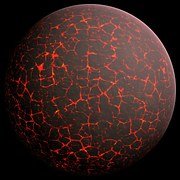So how many planets are there in the Solar System ? Well it seems no one really knows . . .
Astronomers investigating unusual coincidences have found something strange.
At the boundary of our known Solar System is a large collection of asteroids and meteors. These objects are thought to be the left over building blocks that just ended up as a floating junk yard since so little energy exists at the extreme boundary of the Solar System to form them into a collection.
However it seems they sometimes collectively point toward a particular direction and astronomers believe another unknown planet might well exist to create this gravitational effect upon these almost forgotten left over materials from creation.
Pluto was demoted in 2006 simply because dear Pluto was found to have hundreds and then thousands of other like wise rocks in its neighborhood. However what sealed Pluto' s fate was the early discovery of a rock LARGER than Pluto, so unless Pluto got fired school kids risked have to learn potentially dozens of new planets names.
However Planet Nine is a likely explanation for some minute but unexplainable behaviors out beyond Pluto. Simply if such a planet exists it is so far away that no one has thought to actually go looking for it, at such a massive distance from the Sun its orbit could literally take thousands of years; while our telescopes are only 500 years old.
Of course this could all be gremlins inside the computers bytes and bits or maybe an amazing new discovery, regardless like everything else in Astronomy if and when this Planet Nine it will simply create thousands of new questions no one has thought of yet. The human mind is amazing in its thirst for new knowledge ! ! !

Thank You Pixabay.C for the images : )
Who are you networked with ; )
http://www.mnn.com/earth-matters/space/stories/does-planet-nine-exist
The term "planet" is poorly defined - well, more contrived as it has no basis in anything other than itself. Generally, good schemas derive from properties in more generic schemas, they're constructed from something rigorous. Poor definitions exist to collect unlike things that are convenient to distinguish.
One thing we know about good definitions is that if you apply some transform t() to a thing to change it into another thing, there is a corresponding transform of similar nature, t'(), that applies to the nomenclature. If you have a triangle and add a side, you get a quadrangle. If you take the ingredients for a cake and follow the recipe, you get a cake. You can produce diagrams that show the one-way and two-way relationships.
For the current definitions of asteroid, planet and comet, you can't do this. You need external parameters that are arbitrary, and you cannot say in advance if a relationship is one-way or two-way because the definitions refer to properties wholly unconnected to the object.
That's not good reasoning. Nor is it acceptable to define the maximum permitted number of planets. We do not limit the number of cities in countries, or the number of countries, to suit school geography grades.
No, we need something better.
There are a number of definitely topologically distinct objects in a solar system. There are objects with no structure, they're grains held by gravity with no adhesion beyond that. There are objects with no core, they're homogeneous. There are heterogeneous objects sorted by mass. There are heterogeneous objects that are unsorted. Both have one core. Then there are objects with multiple cores.
Some objects are child objects, spawned from another. Our moon is one. Many small asteroids have evaporated and recondensed, so are not primordial. Ceres seems to be a captured comet.
These may not be the attributes you'd use, but they show intrinsic attributes exist and can be used. Such properties will be true for all observers for a meaningful length of time. So why not start by forgetting a meeting of the IAU that may have violated quorum rules and decide what is intrinsic enough to satisfy a planetary scientist, cosmologist or astronomer as being useful to everyone?
Humans are funny things, they love to argue over things; they also love to try and order and quantity things. Every day billions is spent on arguing with money which is the better football or singer by comparison. It is what humans do to justify their curiosity of things.
Those bits of space junk have been out there for millennia, it made no difference to Earth until a huge one visited destruction on the Dinosaurs by rapid climate change as it exploded into the Gulf of Mexico.
Who ever is the boss with the most respect or power decides, someone disliked Pluto and wrote a set of arbitary rules to make a Planet a Plutooid = (dwarf planet).
If some sponsor decides to donate a million dollars toward the upcare of the ISS on condition that Pluto is REmade into PLANET status, then Pluto will soon be the ninth planet again.
Money and egos and power as prestige alter how we view the world and our Solar System. I would love to have seen what the Voyager space bots have seen . . .
Doing an article on the Callisto now! :d I have linked your post and will mention you in credits. Namaste~!
Ah Kool and mights fine thanks @ you : ) You mean the Moon Callisto ?
BTW 0521561272 is the greatest book ever written ! ! ! ; )
Yes I do mean the Moon Callisto! Thank you for the book number :D
I think that the correct answer is "it depends who you are talking with" :)
This post has been linked to from another place on Steem.
Learn more about and upvote to support linkback bot v0.5. Flag this comment if you don't want the bot to continue posting linkbacks for your posts.
Built by @ontofractal